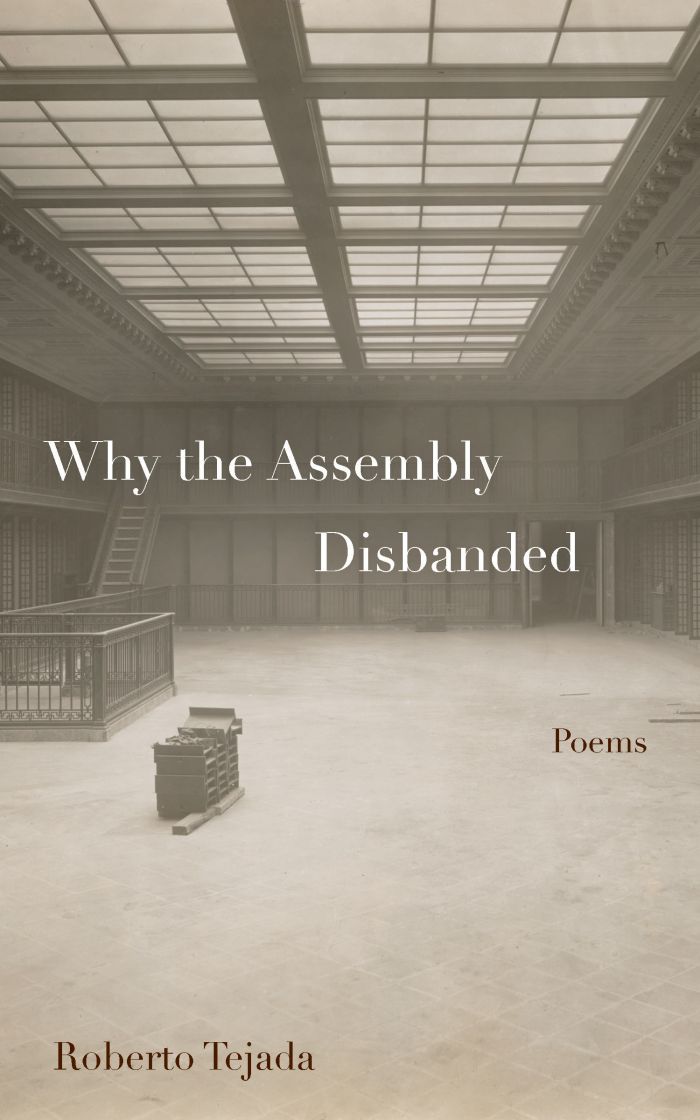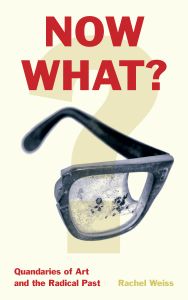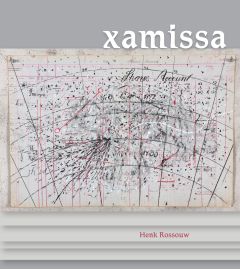Why the Assembly Disbanded

This book can be opened with

Pushing the boundaries of Latinx literature and what constitutes a borderlands poetics.
Throughout Roberto Tejada’s body of work, the renowned poet and celebrated critic has explored themes of Latinx culture, politics, history, language, and ecologies. In his latest collection, Why the Assembly Disbanded, he presents a unique contribution to Latinx letters that reflects on the relations between the United States and Latin America, especially their real and symbolic borderlands.
Immersive, postmodern, and philosophical, Why the Assembly Disbanded provides an associative, critical Latinx aesthetic connecting the Mexico–United States borderlands to Latin America’s neo-baroque heritage. Migrants, settlers, tourists, and exiles moving across various hemispheric landscapes are featured in these exuberant, capacious, and self-reflexive poems. Tejada relates the ravages of white supremacy in our culture that, together with immigrant precarity, turn home into a place of foreboding and impending eviction, even as a dream-weather makes room at last for scenes of possibility and attainment in the account of human history.
The sweeping futuristic vistas open on to narratives of colonial extraction, human displacement, abuses of capitalism, mass media spectacle, the antagonism of language and technical images in the sensorium of urban and digital life-worlds, and the relations of desire encouraged by pictures and words in the economy of attention. Los Angeles and Mexico City figure prominently in poems committed to voicing modes of formation and community in an intersectional reckoning of personhoods prompted in work by artists Betye Saar, Amiri Baraka, Connie Samaras, and Rubén Ortiz Torres.
With language given to pageantry, tonal precision, and a hopeful lyric radiance that can accommodate ecstasy and justice, Roberto Tejada’s carnivalesque, borderland imagery pushes the boundaries of Latinx literature. World-building by way of reverie, speculation, and retro-futurist tableaux, and with vivid, sometimes violent particularity, his poems enact hallucinatory realities of the hemisphere: an imagination that triangulates history, lyricism, and art as social practice.
A stunningly original, politically complex, and masterful book of poems. Why the Assembly Disbanded, in its deep syntactical meditations and ever surprising use of powerful, yet subtle language and evocative forms, cuts out of the fear and pathos of the day as it arrests and reminds us of the need for invention and wonder at this precarious moment.—Ronaldo V. Wilson, University of California, Santa Cruz
Why the Assembly Disbanded by Roberto Tejada (Feb. 11, $16.95 trade paper, ISBN 978-0-8232-9925-6). Reflecting on the state of affairs between the U.S. and Latin America, Tejada writes on white supremacy, immigration, intersectional identity, and community.—Publishers Weekly, Spring Announcements
That Tejada’s new book faces up to constant threats to assembly—whether that assembly is of artists, immigrants, or outsiders in the society of alternate belonging—makes the playfulness of his assemblage all the more powerful.—World Literature Today
Why the Assembly Disbanded by Roberto Tejada endeavors to assemble the heart of assemblages; it fights to illustrate the power struggle built in the plinths of assemblage, the borderlines that break it, and the often-quiet forces that attempt to wrench power from the individual and collective.—Michigan Quarterly Review
1. Society of Alternate Belonging
Two Guardians | 3
Anvil and Bellows | 5
Elevator Invention | 8
American Household | 10
Why Fear Heights | 12
Delayed or Modified | 13
Or Why the Assembly Disbanded as Before | 14
Lost Continent | 16
2. Amend, Delay, Curve, and Disquiet
Baraka Inscape | 23
Film Noir: Telescope | 25
Freeway | 28
Nightshade, Camouflage | 30
Escena | 32
Freestanding Form | 34
Beyond Reckoning | 35
The Transport Hours | 38
Mortar and Method | 40
3. Kill Time Objective
Color Wheel | High Water | 47
Kill Time Objective | 49
Liquid M | 51
Venus a Polygon | 53
Indivisible Continuum | 54
Vanishing | 62
Envío | 64
List of Illustrations | 69
Notes | 71
Acknowledgments | 73





